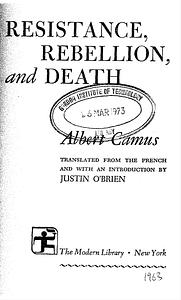Take a photo of a barcode or cover
Here Camus discusses the gruesome process of death by guillotine and how that act is so awful, it only adds to the horror of the original crime committed by the perpetrator (or conversely victim of capital punishment). How can capital punishment confer greater peace to the public when it’s so upsetting and can only be referred to obliquely and indirectly by the media and public when discussed (“the condemned paid his debt to society” vs “the man had his fucking head chopped off today and blood spurted everywhere and the eyes continued to blink for minutes after decapitation”). Does the practice truly set an example for those who might commit crimes in the future or is it really just an exercise in revenge?
Revisiting The Stranger after reading this would be fascinating.
Revisiting The Stranger after reading this would be fascinating.
informative
medium-paced
"Para continuar a fingir que a guilhotina seja exemplar, o Estado é levado, desta forma, a multiplicar assassinatos bem reais, a fim de evitar um assassinato desconhecido, sobre o qual ele não sabe e nunca saberá se tem uma única oportunidade de ser perpretado."
"Quando Hugo escreveu que, para ele a guilhotina se chama Lesurques, não quer dizer que todos os condenados que ela decapita são Lesurques, mas que basta um Lesurques para que ela seja desonrada para sempre."
"Os séculos do Iluminismo, como se diz, queriam eliminar a pena de morte, sob o pretexto de aue nenhum ser humano seria intrinsicamente bom. Naturalmente, ele não o é (é pior ou melhor). Mas é porque ele não o é que nenhum de nós se pode colocar como juiz absoluto e sentenciar a eliminação definitiva do pior dos culpados, porque nenhum de nós pode pretender à inocência absoluta."
"Quando Hugo escreveu que, para ele a guilhotina se chama Lesurques, não quer dizer que todos os condenados que ela decapita são Lesurques, mas que basta um Lesurques para que ela seja desonrada para sempre."
"Os séculos do Iluminismo, como se diz, queriam eliminar a pena de morte, sob o pretexto de aue nenhum ser humano seria intrinsicamente bom. Naturalmente, ele não o é (é pior ou melhor). Mas é porque ele não o é que nenhum de nós se pode colocar como juiz absoluto e sentenciar a eliminação definitiva do pior dos culpados, porque nenhum de nós pode pretender à inocência absoluta."
When I first read Albert Camus' discussion of the only serious philosophical problem, I felt like this guy is using complicated words to get realising even complicated thoughts which emerged from primitive ideas can become simple when questioned in the proper hierarchy. Pretty sure the world has seen many others with the same qualities but here, in my case, those many others are just 'others'. This essay about capital punishment was written in January 1957, the year which took him around the globe with his Nobel prize. Many alleged sources state it was this essay (having had spoken against France who practiced the guillotine till late 1970s) that got him the prize and I wouldn't be surprised if it was the case. The essay is a mixture of logic, uncertainty, humanism and a bit of empathy with statistical records from the late happenings.
Recently, I remember to have written an essay about advocating how laws should be enacted based upon objective facts irrespective of the facets of the problem as a part of applying for the apprentice opportunity to a member of the parliament locally. Now that after reading this essay of Camus, I sounded like a extreme radicalised individual in the essay of mine waiting to be deported intentionally so that I could ask countries like Canada or Sweden for Political Asylum. I wanted the human beliefs and emotion not interfering the laws but if only I have had a sober and diversified look at the problems not only just the environmental and economical issues but also the psychological and sociological issues. Now that I realise maybe it's never possible to outcast belief systems and emotions from lawmaking when it's an integral innate part of us. At the end of the day, its always better to be a humanitarian rather a totalitarian.
Maybe Science and Humanity studies should've taken together as a single manifestation for making life better; for having a balanced intellectual discussion on anything. Maybe never meant to be separated as they are now, and if it hadn't we might have had a better chance around us and beyond.
"There is a solidarity of all man in error and aberration. If justice has any meaning in this world, it means nothing but the recognition of that solidarity. It cannot, by its very essence, diverse itself from compassion."
Humans are messy ourselves, how come our law would be? This isn't an attempt to try go into nihilistic aberration of the things that we cherish but acknowledging that we have flaws so that we can try to make better realistic versions of our whims and reflect them outwards appropriately.
Recently, I remember to have written an essay about advocating how laws should be enacted based upon objective facts irrespective of the facets of the problem as a part of applying for the apprentice opportunity to a member of the parliament locally. Now that after reading this essay of Camus, I sounded like a extreme radicalised individual in the essay of mine waiting to be deported intentionally so that I could ask countries like Canada or Sweden for Political Asylum. I wanted the human beliefs and emotion not interfering the laws but if only I have had a sober and diversified look at the problems not only just the environmental and economical issues but also the psychological and sociological issues. Now that I realise maybe it's never possible to outcast belief systems and emotions from lawmaking when it's an integral innate part of us. At the end of the day, its always better to be a humanitarian rather a totalitarian.
Maybe Science and Humanity studies should've taken together as a single manifestation for making life better; for having a balanced intellectual discussion on anything. Maybe never meant to be separated as they are now, and if it hadn't we might have had a better chance around us and beyond.
"There is a solidarity of all man in error and aberration. If justice has any meaning in this world, it means nothing but the recognition of that solidarity. It cannot, by its very essence, diverse itself from compassion."
Humans are messy ourselves, how come our law would be? This isn't an attempt to try go into nihilistic aberration of the things that we cherish but acknowledging that we have flaws so that we can try to make better realistic versions of our whims and reflect them outwards appropriately.
welcome to: THE PENGUIN GREAT IDEAS PROJECT!
as you all know, i'm:
a) addicted to projects (and my book club, my long classics project, and my genius project are all on pause)
b) mildly behind on my reading challenge (see: months-long reading slump and corresponding existential crisis)
c) very into short books that make me look smart (much like the penguin great ideas collection).
i have acquired a couple dozen penguin great ideas installments, and i will be attempting to read one a day until i get bored, catch up, or reach spiritual fulfillment!
find past books here:
WHAT IS EXISTENTIALISM?
REFLECTIONS ON THE GUILLOTINE
THREE JAPANESE BUDDHIST MONKS
let's do this!
in all seriousness, if i was only allowed to have one opinion, it'd be being against the death penalty. this didn't have too much new to say on the argument (although it was written the better part of a century ago, to be fair) but it is sharp and concise.
i'm glad to have read it.
as you all know, i'm:
a) addicted to projects (and my book club, my long classics project, and my genius project are all on pause)
b) mildly behind on my reading challenge (see: months-long reading slump and corresponding existential crisis)
c) very into short books that make me look smart (much like the penguin great ideas collection).
i have acquired a couple dozen penguin great ideas installments, and i will be attempting to read one a day until i get bored, catch up, or reach spiritual fulfillment!
find past books here:
WHAT IS EXISTENTIALISM?
REFLECTIONS ON THE GUILLOTINE
THREE JAPANESE BUDDHIST MONKS
let's do this!
in all seriousness, if i was only allowed to have one opinion, it'd be being against the death penalty. this didn't have too much new to say on the argument (although it was written the better part of a century ago, to be fair) but it is sharp and concise.
i'm glad to have read it.
informative
reflective
fast-paced
Maybe 4 stars is a little generous but I liked seeing Camus’ opinion on this topic.
challenging
dark
informative
reflective
sad
slow-paced
این کتاب خوب بود واقعاً. کامو تکتک استدلالهای موافقان اعدام رو مطرح میکنه و بعد به تکتکشون پاسخ منطقی میده. مختصر و مفید.
توی reviewها خوندم نوشته بودن این کتاب ترجمه نشده، که خب درست نیست. من ترجمهی آقای قاسم رستمی از نشر فرهنگ جاوید رو خوندم و ترجمهی خوبی هم بود.
کمی توصیفهای دربارهی صحنهی اعدام اذیتم کرد که البته هرکسی کتابی دربارهی موضوع اعدام انتخاب میکنه باید آمادگی روبرو شدن با این توصیفها رو هم داشته باشه.
توی reviewها خوندم نوشته بودن این کتاب ترجمه نشده، که خب درست نیست. من ترجمهی آقای قاسم رستمی از نشر فرهنگ جاوید رو خوندم و ترجمهی خوبی هم بود.
کمی توصیفهای دربارهی صحنهی اعدام اذیتم کرد که البته هرکسی کتابی دربارهی موضوع اعدام انتخاب میکنه باید آمادگی روبرو شدن با این توصیفها رو هم داشته باشه.



